 Global| Nov 26 2003
Global| Nov 26 2003Initial Jobless Insurance Claims Lowest Since January 2001
by:Tom Moeller
|in:Economy in Brief
Summary
Initial claims for jobless insurance fell 11,000 last week to 351,000, the lowest level since January 2001. Consensus expectations had been for claims of 360,000 and the prior week's level was revised up. The four-week moving average [...]
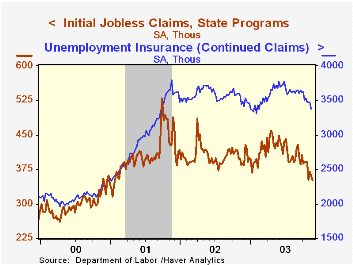
Initial claims for jobless insurance fell 11,000 last week to 351,000, the lowest level since January 2001. Consensus expectations had been for claims of 360,000 and the prior week's level was revised up.
The four-week moving average of initial claims fell to 358,750 (-8.5% y/y).
Continuing claims for unemployment insurance plummeted 105,000 in the latest week and the prior week was revised to a decline of 3,000 versus the 21,000 increase reported initially. Continuing claims were at the lowest level since late-January.
The insured rate of unemployment was steady at 2.7% for the fourth consecutive week versus the high of 3.0% in June.
| Unemployment Insurance (000s) | 11/22 | 11/15 | Y/Y | 2002 | 2001 | 2000 |
|---|---|---|---|---|---|---|
| Initial Claims | 351.0 | 362.0 | -9.5% | 404.3 | 406.0 | 299.7 |
| Continuing Claims | -- | 3,368 | -2.3% | 3,575 | 3,022 | 2,114 |
by Tom Moeller November 26, 2003
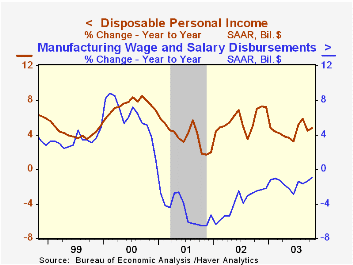
Personal income rose an expected 0.4% (+3.7% y/y) in October following 0.3% gains in each of the prior three months. Personal disposable income rebounded 0.4% (4.8% y/y) following the 1.0% decline in September.
Wages and salaries rose 0.2% (2.3% y/y). Wages fell 0.2% (-1.0% Y/Y) in the factory sector and have fallen 11.3% since the peak in early 2000. During the last twenty years there has been a 73% correlation between the y/y growth in total wages and the growth in personal consumption expenditures.
Consumer spending fell slightly, as expected, following a revised 0.3% drop in September. Spending on durable goods fell 2.3% (+6.6% y/y) as sales of light vehicles fell for the second month, down 9.5% m/m to 15.64M units. Spending on nondurable goods fell 0.1% (6.4% y/y) as lower gasoline prices pulled the price deflator for nondurables down 0.4%. Services spending rose 0.5% (4.6% y/y).
The PCE price deflator fell 0.1%. Less food and energy prices rose 0.1% (1.2% y/y) for the third consecutive month. The durables' price deflator fell 0.4% (-3.9% y/y) and services prices rose 0.2% (2.9% y/y) for the fourth month.
The savings rate rose to 3.3% but remained at the low end of the range of the last two years.
| Disposition of Personal Income | Oct | Sept | Y/Y | 2002 | 2001 | 2000 |
|---|---|---|---|---|---|---|
| Personal Income | 0.4% | 0.3% | 3.7% | 2.7% | 3.3% | 8.0% |
| Personal Consumption | -0.0% | -0.3% | 5.4% | 4.5% | 4.5% | 7.0% |
| Savings Rate | 3.3% | 3.0% | 3.8% | 3.7% | 2.3% | 2.8% |
| PCE Price Deflator | -0.1% | 0.3% | 2.0% | 1.4% | 2.0% | 2.5% |
by Tom Moeller November 26, 2003
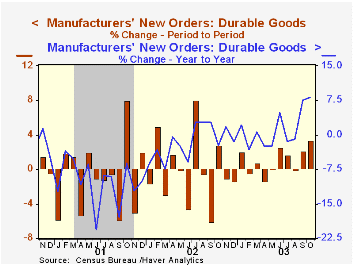
Durable goods orders surged 3.3% in October following an upwardly revised 2.1% September gain. Consensus expectations had been for a 0.5% October rise.
Excluding the volatile transportation sector durable goods orders jumped 2.8% following a 5.1% September gain that was double the initial estimate. Orders for transportation equipment jumped 5.5% last month as orders for nondefense aircraft jumped 22.0% following three months of decline.
Strength in capital goods orders powered overall orders and rose 2.8%. Excluding aircraft and parts, nondefense capital goods orders added another 1.7% (12.7% y/y) to the 5.8% September gain, revised up from 3.9%.
Orders for computers & electronic products jumped another 4.0% (28.7% y/y) following the 7.0% September rise, revised from 2.6%. Orders for computers & related products fell moderately for the second month but orders for communication equipment jumped 25.0% (66.1% y/y). Electrical equipment orders fell slightly (-0.5% y/y).
Shipments of durable goods surged 1.9% (1.9% y/y). Excluding transportation shipments rose 1.4% (3.7% y/y), strong for the fourth month in five.
Durable inventories, up 0.2% (-3.1% y/y), rose for the first month since December of last year. The gain reflected accumulation in the transportation, computers and machinery sectors.
| NAICS Classification | Oct | Sept | Y/Y | 2002 | 2001 | 2000 |
|---|---|---|---|---|---|---|
| Durable Goods Orders | 3.3% | 2.1% | 8.2% | -1.7% | -10.5% | 3.2% |
| Nondefense Capital Goods | 2.8% | 5.1% | 12.8% | -7.2% | -15.5% | 7.4% |
by Tom Moeller November 26, 2003
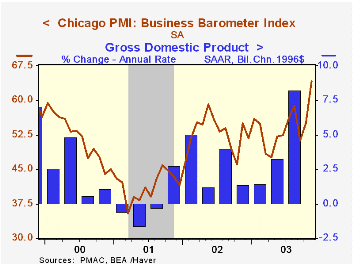
The Chicago Purchasing Managers Business Barometer for November rose much more than expected to 64.1 from 55.0 in October. The rise was to the highest level since February 1995.
Strength amongst the component indexes was broad based. New orders (73.3) and production (69.0) were at the highest levels since the mid-1990s and order backlogs were also up. Employment (48.5) dropped back below the dividing line between rising and falling jobs.
During the last twenty years there has been a 56% correlation between the level of the Chicago PMI and quarterly growth in real GDP.
The index of prices paid jumped to 61.5, the highest level since March.
| Chicago Purchasing Managers Index, SA | Nov | Oct | Y/Y | 2002 | 2001 | 2000 |
|---|---|---|---|---|---|---|
| Business Barometer | 64.1 | 55.0 | 55.0 | 52.7 | 41.4 | 51.8 |
| New Orders | 73.3 | 59.2 | 62.5 | 56.3 | 42.3 | 53.1 |
| Prices Paid | 67.3 | 61.5 | 60.1 | 56.9 | 50.4 | 65.6 |
by Tom Moeller November 26, 2003
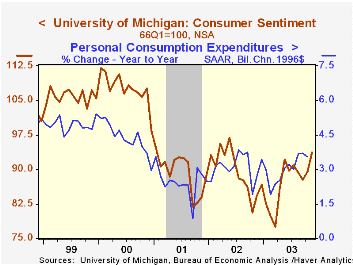
The University of Michigan’s consumer sentiment index rose a bit less than expected for the full month of November. At 93.7, the index was up only slightly from the mid-month read of 93.5 and was versus Consensus expectations for 94.0.
It was the highest level of Consumer Sentiment since May 2002.
During the last ten years there has been a 71% correlation between the level of consumer sentiment and the y/y change in real PCE. That correlation has risen to 82% during the last five years.
The current conditions index rose to 102.5, the highest level since May 2002.
The expectations index rose to 88.1, the highest level since May of this year.
The University of Michigan survey is not seasonally adjusted.It is based on telephone interviews with 250 households nationwide on personal finances and business and buying conditions. The survey is expanded to a total of 500 interviews at month end.
| University of Michigan | Nov | Oct | Y/Y | 2002 | 2001 | 2000 |
|---|---|---|---|---|---|---|
| Consumer Sentiment | 93.7 | 89.6 | 11.3% | 89.6 | 89.2 | 107.6 |
| Current Conditions | 102.5 | 99.9 | 10.1% | 97.5 | 100.1 | 115.2 |
| Consumer Expectations | 88.1 | 83.0 | 12.2% | 84.6 | 82.3 | 102.7 |
by Tom Moeller November 26, 2003
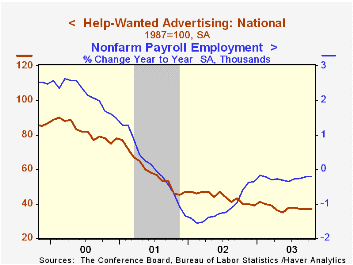
The Conference Board’s National Index of Help-Wanted Advertising remained at 37 last month, the depressed level in place since August.
During the last ten years there has been a 93% correlation between the level of help-wanted advertising and the year-to-year change in non-farm payrolls.
The proportion of labor markets with rising want-ad volume fell to 37% from a downwardly revised September level of 39%.
Indexes of help wanted remained depressed across the country, although Richmond, San Antonio and Sacramento showed some improvement.
The Conference Board surveys help-wanted advertising volume in 51 major newspapers across the country every month.
| Conference Board | Oct | Sept | Oct '02 |
|---|---|---|---|
| National Help Wanted Index | 37 | 37 | 40 |
by Tom Moeller November 26, 2003
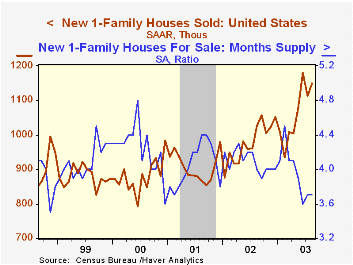
Sales of new single family homes fell 3.5% in October to 1.105M (AR). It was the third decline in the last four months from the record high in June. Consensus estimates were for a lesser decline to 1.140M.
Sales declines were spread across the country.
The median price of a new home rose to $190,900 (0.9% y/y).
These new home sales data from the US Census Department reflect current sales versus the existing home sale figures which reflect closings on past sales.
| Homes Sales (000s, AR) | Oct | Sept | Y/Y | 2002 | 2001 | 2000 |
|---|---|---|---|---|---|---|
| New Single-Family | 1,105 | 1,145 | 10.0% | 977 | 907 | 880 |
Tom Moeller
AuthorMore in Author Profile »Prior to joining Haver Analytics in 2000, Mr. Moeller worked as the Economist at Chancellor Capital Management from 1985 to 1999. There, he developed comprehensive economic forecasts and interpreted economic data for equity and fixed income portfolio managers. Also at Chancellor, Mr. Moeller worked as an equity analyst and was responsible for researching and rating companies in the economically sensitive automobile and housing industries for investment in Chancellor’s equity portfolio. Prior to joining Chancellor, Mr. Moeller was an Economist at Citibank from 1979 to 1984. He also analyzed pricing behavior in the metals industry for the Council on Wage and Price Stability in Washington, D.C. In 1999, Mr. Moeller received the award for most accurate forecast from the Forecasters' Club of New York. From 1990 to 1992 he was President of the New York Association for Business Economists. Mr. Moeller earned an M.B.A. in Finance from Fordham University, where he graduated in 1987. He holds a Bachelor of Arts in Economics from George Washington University.
More Economy in Brief
 Global| Feb 05 2026
Global| Feb 05 2026Charts of the Week: Balanced Policy, Resilient Data and AI Narratives
by:Andrew Cates






